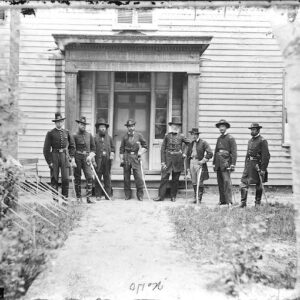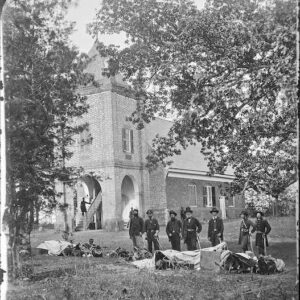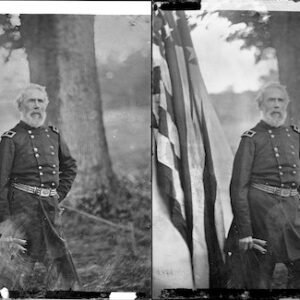Tag: Sumner (Edwin V.)
 Wikipedia says: Edwin Vose Sumner (January 30, 1797 – March 21, 1863) was a career United States Army officer who became a Union Army general and the oldest field commander of any Army Corps on either side during the American Civil War. His nicknames “Bull” or “Bull Head” came both from his great booming voice and a legend that a musket ball once bounced off his head.
Wikipedia says: Edwin Vose Sumner (January 30, 1797 – March 21, 1863) was a career United States Army officer who became a Union Army general and the oldest field commander of any Army Corps on either side during the American Civil War. His nicknames “Bull” or “Bull Head” came both from his great booming voice and a legend that a musket ball once bounced off his head.
Sumner fought in the Black Hawk War, with distinction in the Mexican–American War, on the Western frontier, and in the Eastern Theater for the first half of the Civil War. He led the II Corps of the Army of the Potomac through the Peninsula Campaign, the Seven Days Battles, and the Maryland Campaign, and the Right Grand Division of the Army during the Battle of Fredericksburg. He died in March 1863 while awaiting transfer.
…In February 1861, Brig. Gen. David E. Twiggs was dismissed from the Army for treason by outgoing U.S. President James Buchanan, and on May 12, 1861, Sumner was nominated by the newly inaugurated Lincoln to replace Twiggs as one of only three brigadier generals in the regular army, with date of rank March 16. Sumner was thus the first new Union general created by the secession crisis. He was then sent to replace Brig. Gen. Albert Sidney Johnston, then in command of the Department of the Pacific in California, and thus took no part in the 1861 campaigns of the war. When Sumner left for California, his son-in-law Armistead Lindsay Long resigned his commission and enlisted with the Confederate Army eventually becoming Robert E. Lee’s military secretary and an artillery brigadier general.
In November 1861, Sumner was brought back east to command a division. When Maj. Gen. George B. McClellan began organizing the Army of the Potomac in March, Sumner was given command of one of its new corps. McClellan had not originally formed corps within the Army; Sumner was selected as one of four corps commanders by President Lincoln, based on his seniority. The II Corps, commanded during the war by Sumner, Darius N. Couch, Winfield Scott Hancock, and Andrew A. Humphreys, had the deserved reputation of being one of the best in the Eastern Theater. Sumner, who was the oldest of the generals in the Army of the Potomac, led his corps throughout the Peninsula Campaign and the Seven Days Battles.
McClellan originally formed a poor opinion of Sumner during the Battle of Williamsburg on May 5, 1862. During McClellan’s absence, Sumner directed the inconclusive battle, which failed to impede the Confederate withdrawal up the Peninsula, and McClellan wrote to his wife, “Sumner had proved that he was even a greater fool than I had supposed & had come within an ace of having us defeated.” At the Battle of Seven Pines, however, Sumner’s initiative in sending reinforcing troops across the dangerously rain-swollen Chickahominy River prevented a Union disaster. He received the brevet of major general in the regular army for his gallantry at Seven Pines. Sumner was struck in the arm and hand by spent balls at the Battle of Glendale. Despite his old-fashioned ideas on discipline and respect for commanding officers, the II Corps troops generally had a positive opinion of him. Sumner was promoted to major general of volunteers on July 4, 1862, with the rank dated to May 5.
In the fall of 1862, at the Battle of Antietam, Sumner was the center of controversy for ordering Brig. Gen. John Sedgwick’s division to launch an attack into the West Woods on the morning of the battle. The assault was devastated by a Confederate counterattack, and Sedgwick’s men retreated in great disorder to their starting point with over 2,200 casualties. Sumner has been condemned by most historians for his “reckless” attack, his lack of coordination with the other corps commanders, accompanying Sedgwick’s division personally and losing control of his other attacking division, failing to perform adequate reconnaissance prior to launching his attack, and selecting an unusual line of battle formation that was so effectively flanked by the Confederate counterattack. Historian M. V. Armstrong’s recent scholarship, however, has determined that Sumner did perform appropriate reconnaissance and his decision to attack where he did was justified by the information available to him.
Sumner’s other divisions drove the weak Confederate center back, but Sumner was badly shaken by the disaster to Sedgwick and heavy casualties to other Union forces. Maj. Gen. William B. Franklin wanted to attack with his fresh VI Corps, but Sumner, who was senior to him, ordered him to hold back. McClellan sustained Sumner.
Shortly before being fired from command of the army in October, McClellan wrote to the War Department a letter recommending that Sumner be relieved of duty, as he doubted that his age and health would permit him to survive another campaign, but nothing came of this and when Maj. Gen. Ambrose Burnside succeeded to the command of the Army of the Potomac, he grouped the corps in “grand divisions” and appointed Sumner to command the Right Grand Division. In this capacity, he took part in the disastrous Battle of Fredericksburg, in which the II Corps, now commanded by Major General Darius N. Couch, suffered heavy casualties in frontal assaults against Confederate troops fortified at Marye’s Heights.


